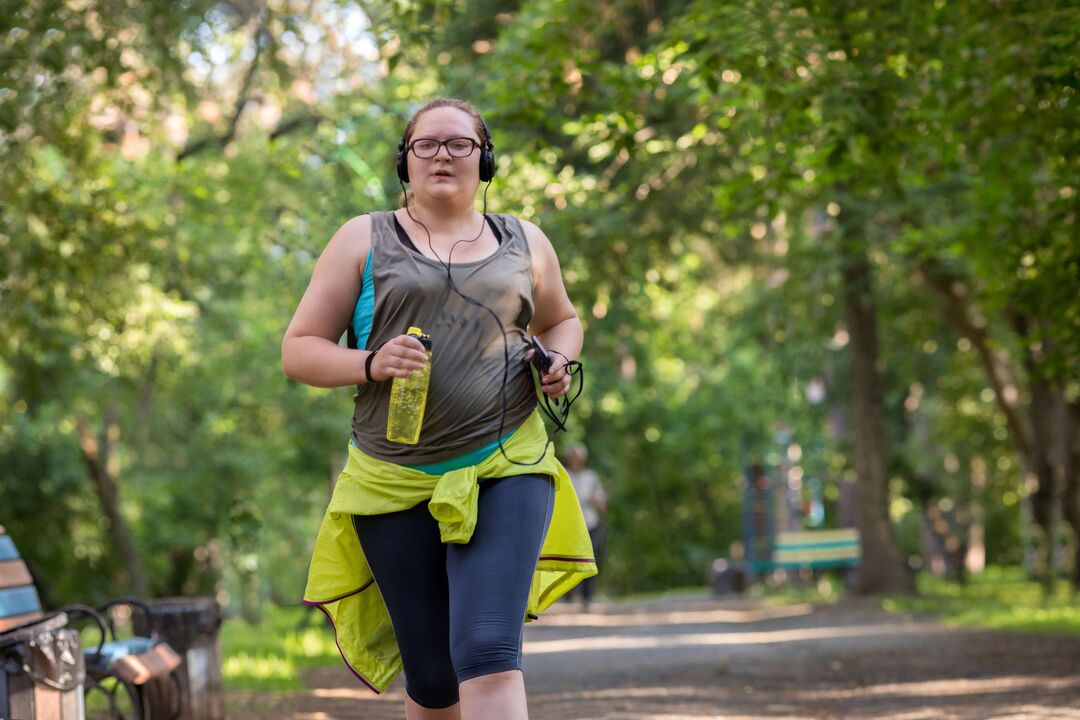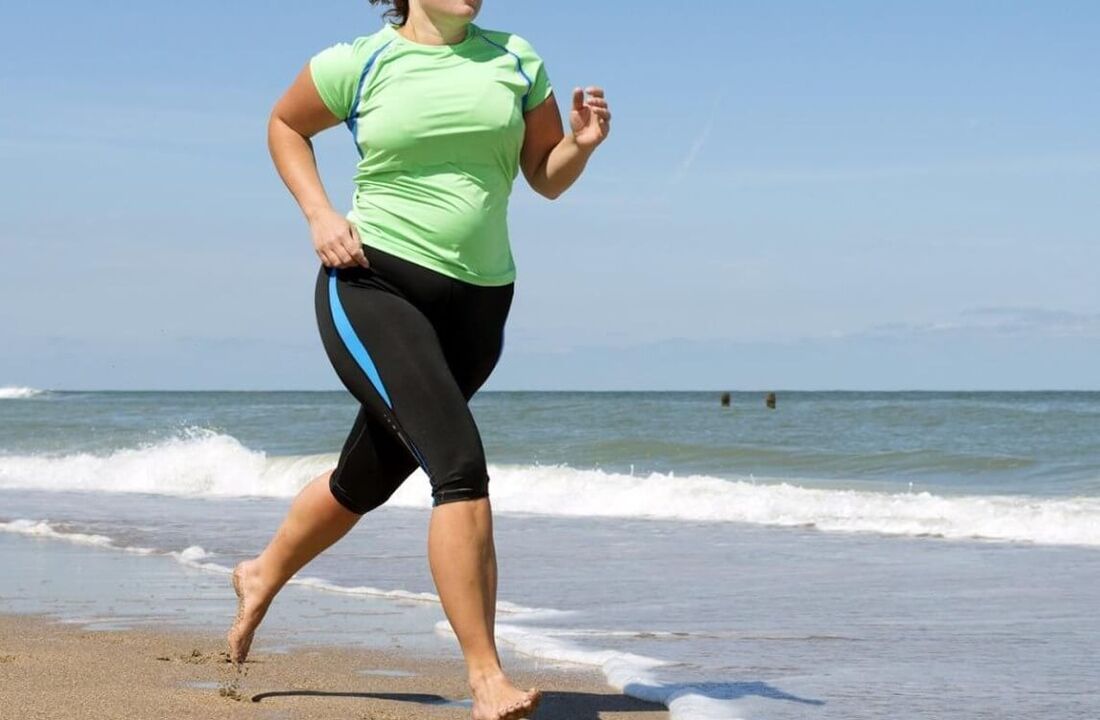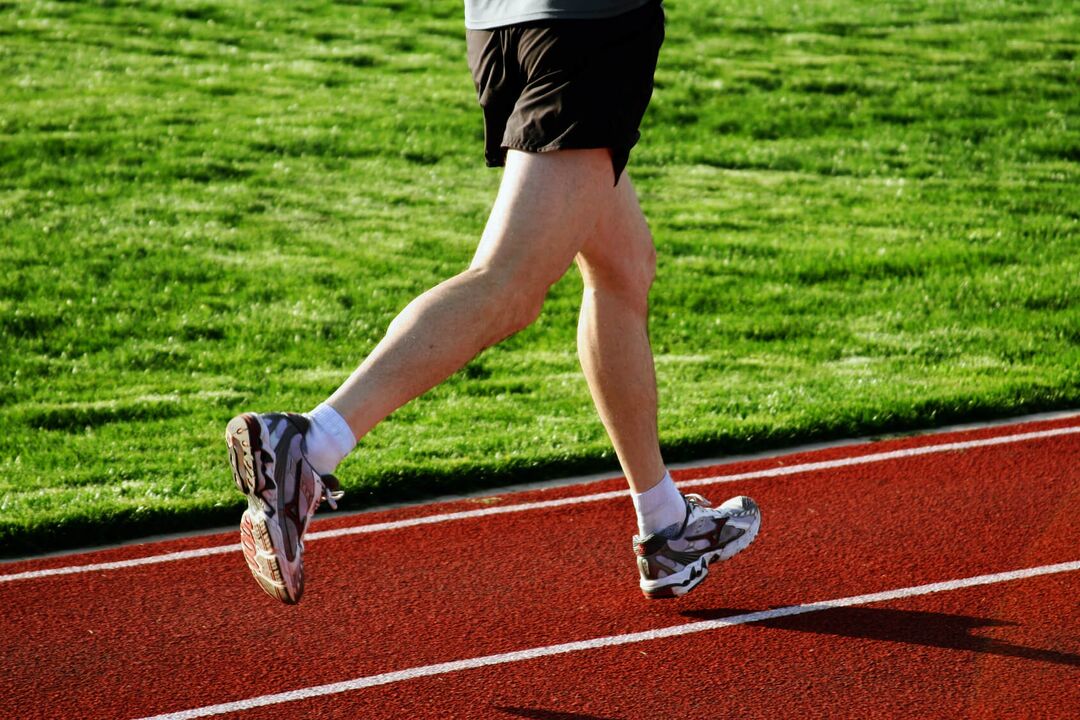Running is considered one of the most effective and affordable weight loss methods. Therefore, most of those who are losing weight, striving to lose as many kilograms as possible in a short period of time, choose it. But does it really help in the fight against overweight? How to run correctly so that training benefits your health? These and other questions will be discussed in more detail in this article.

Running is quite an intense and difficult sport. Especially for people with extra pounds - the load on the spine and joints increases, unpleasant and even painful sensations arise. In addition, severe shortness of breath appears, the pressure can seriously increase. Therefore, beginners who start training from scratch should be extremely careful, attentive to their own body and well-being. There are the following basic rules:
- choose a training program, its number per week, intensity; it is better with a specialist;
- the optimal thing is that the training begins with a slight warm-up of the joints. It is worth paying special attention to the knees - it is they that bear the main load during the lesson. Duration - 5-7 minutes;
- You need to finish the workout with a light stretch: so that the muscles recover faster. Duration - 5-10 minutes;
- beginners need to increase their running time gradually. For the first time, 5-7 minutes of easy running will be enough.
1, 5-2 hours before jogging, you need to arrange a modest meal. It is optimal that most of it falls on protein and carbohydrates - this is the energy that the body needs during exercise.

What is running and why is it needed
Running is classified as an aerobic exercise. During training, the cells of the body are actively saturated with oxygen, which brings the following benefits:
- strengthen the cardiovascular system;
- prevention of blood clots, cholesterol plaques;
- strengthening of immunity;
- increase efficiency, improve memory;
- normalization of metabolic processes;
- lower cholesterol levels;
- general improvement of well-being.
Running benefits the entire body by increasing blood circulation. In addition, during a run, the "hormone of happiness" is actively released - serotonin, which improves mood and helps fight insomnia. Regular exercise also helps strengthen the muscles in your legs, abdomen, and hips.

What clothes are better for running in summer and winter
Training clothing should always be adapted to the weather, as it fulfills an important function: it regulates heat transfer. You should not focus on the season, winter or summer, it is better to pay attention to the room temperature:
- From -3℃ to +10℃: thin hat or earmuffs, windbreaker or sleeveless jacket with hood in case of rain, turtleneck or sweatshirt, T-shirt or T-shirt made of high-quality breathable material, warm pants.
- From +10℃ to +20℃: headband or baseball cap, t-shirt, light sweatshirt or windbreaker, if it is raining or very cold outside, leggings or pants without insulation.
- Above +20 ℃: T-shirt or T-shirt made of high-quality breathable material, shorts or leggings.
- Below -3℃: hat, thermal underwear, sports jacket and warm pants. In winter, special attention should be paid to protecting the body, do not forget about a scarf and gloves.
A set of clothes should be washed regularly. To do this, it is recommended to use a hypoallergenic powder suitable for daily use.
Choosing the right and comfortable running shoes
Shoes are the next important component of running right after clothing. The right choice of running shoes will make training not only comfortable, but also safe. Attention should be paid to the following criteria:
- lightness - you should not buy sneakers with a powerful and heavy platform;
- seasonality - for the winter period, you need to take fully closed shoes, in the summer you can run in light sneakers with mesh inserts;
- security: the leg must be well fixed;
- Cushioning: Running shoes should have special cushioning plates located in the middle of the foot. Usually in this place there is a notch, a small depression.
It is better to buy shoes in a specialized store. A good running shoe will last a long time and will ensure safety, comfort and convenience during your run.
How to run to lose weight
In order for the training to be successful, after there were no injuries, the mood did not go away - you need to run correctly. Calculation of distance, intensity, duration - all this depends on the initial body weight of a person.
Let's take a closer look at how weight and running are related.
- If the body weight exceeds 110 kilograms - intensive training is contraindicated, as it increases the risk of injury. It is recommended to alternate running and walking: run 80-100 meters, walk the same amount. Start with 10-15 minutes, gradually increasing the duration to 30-40 minutes.
- From 85 to 110 kilograms: Light jogging is recommended. You can also combine it with walking, but in a different way. For example, two minutes of running is replaced by one minute of rest in the form of a walk. The duration of the training is from 20 to 40 minutes.
- From 60 to 85 kilograms: jog without rest for up to an hour.
Don't expect long, grueling workouts to help you lose weight for a long time. After a week of so much violence against oneself, the desire to run will disappear, classes will come to nothing. Therefore, the running program, its intensity, duration, must be carefully selected.

Running to lose weight legs and abdomen
Fat burning does not start from the first minutes of class. It is important to reach a certain stage, which is called the aerobic zone. How to understand that she has arrived? give a pulseA fat burning interval is considered to be an indication equal to 60-70% of maximum heart rate (MHR). But it is not enough to go to it, it is important to keep it for 20-30 minutes.
The maximum heart rate is calculated by a simple formula: "220 - age in years. "For a 22 year old girl MCHP = 220-22 = 198.
In addition to the aerobic zone, there are others:
- rest - 35-40% MCHP;
- heating - 50-60% MCHP;
- aerobic - 60-70% MCHP;
- resistance - 80-90% of MCHP;
- dangerous - 90-95% of MCHP.
Heart rate should be monitored throughout training. This will help not only reduce weight, but also protect yourself from various negative consequences.
Contraindications for running to lose weight
It seems to many that jogging is a universal type of training suitable for everyone. In fact, this is far from the case. There is a list of contraindications, which includes the following items:
- joint diseases;
- pathology of the organs of the cardiovascular and respiratory systems;
- colds and flu, especially if there is an increase in temperature;
- diseases in the acute phase - active training can worsen the condition;
- myopia, glaucoma: strenuous exercise can cause retinal detachment.
Also, classes may be contraindicated for older people. In any case, you can run or not, a question that everyone should ask a specialist.
Technique for a safe and correct race
The main thing when running is not to harm your health. To do this, you must strictly observe safety precautions:
- It is optimal to start with a fast walk and gradually move to a slow run. Then the training will be easier, there will be no severe shortness of breath, increased heart rate.
- While jogging, the body should be slightly bent, the arms bent at the elbows.
- The amplitude of the movements of the hand should be small, it should help and not confuse the rhythm.
- You need to breathe through your nose. If you want to inhale through your mouth, take a deep breath, or exhale, then you need to slow down and restore your heart rate.
- You just need to wear comfortable clothes and shoes. It should be light, not restrict movement. Women are advised to pay attention to special sports bras that support their breasts while running.
- Every movement should be smooth, even, as sudden jumps or steps can cause injury.
Maintaining health and obtaining a positive result from training is possible only with strict adherence to the technique of its implementation. Otherwise, jogging can be replaced by endless treatment.
Run
Jogging is the most common form of exercise. It is usually slow, unhurried, comparable in intensity to fast walking. Such a lesson should last at least 30-40 minutes. During this time, the pulse will reach the aerobic stage, at which the process of intensive calorie burning will begin.
Running not only improves the figure, but also has a beneficial effect on health, improves well-being.
shuttle race
Many ferry races are familiar from school. This is a good way to diversify your usual training. These short runs can be part of a jog or used as a warm-up.
Shuttle running has a good effect on the central nervous system, improves reaction, concentration.
pique
Sprint is running at full throttle. Of course, jogging at that pace can't last 30-40 minutes, but you can start or end a lesson with sections so intense that they can be inserted every 5-7 minutes of measured jogging. This will burn more calories, build muscle strength, and increase endurance.
interval training
Interval training in the sports community is considered the most effective. They involve alternating work and rest, running and walking. Then the body does not have time to get used to it, each new step for him is something new that requires strength. Therefore, the aerobic heart rate zone is reached much faster and the intensive calorie burning process occurs earlier.
Below is an eight-week mixed training program that starts with interval training and gradually progresses to jogging.

The best places to run
The best place to train is a specially designed one. They can be school stadiums or sports fields. Conventional asphalt is a very rough and hard surface that does not absorb well. Every step or jump puts a huge load on your joints, which even the best running shoes can't compensate for.
Another option is country roads or parks. The absence of a rough surface reduces the load on the joints, the spine and makes running safer. Also, changing terrain, alternating heights, various obstacles on the way will allow you to burn more calories due to the alternation of types of load.
For quick temporary weight loss, running on a treadmill will be no less effective.
running training program
Increase the duration, intensity of training; gradually is recommended. This will help the body to adapt, to get used to a new type of load. The following table shows the 8-week training program.
| Monday | Tuesday | Wednesday | Thursday | Friday | Saturday | Sunday | |
|---|---|---|---|---|---|---|---|
| Week 1 |
|
Break |
|
Break |
|
|
Break |
| 2 weeks |
|
Break |
|
Break |
|
|
Break |
| 3 weeks |
|
Break |
|
Break |
|
|
Break |
| 4 weeks |
|
Break |
|
Break |
|
|
Break |
| 5 week |
|
Break |
|
Break |
|
|
Break |
| 6 weeks |
|
Break |
|
Break |
|
|
Break |
| 7 week |
|
Break |
|
Break |
|
|
Break |
| 8 weeks |
|
Break |
|
Break |
|
|
Break |
*** can be skipped, finish walking
At the end of the eighth week, the program can be restarted or changed to a one-hour jog.
How to adjust load while running
Until the training has become constant, familiar, you need to be attentive to your own well-being, adjusting the load while running. This will help you find the most comfortable individual pace that you can maintain throughout your workout.
How to understand that the load adapts to the body? The first criterion is breathing. It is optimal when a person during training does not feel the desire to take a deep breath or exhale, but can hold a conversation with a jogging partner.
Another criterion is the pulse. As already mentioned, you should be in the aerobic zone.
What to do if you can no longer run
If during a workout you feel discomfort, you want to switch from running to a step, it means that initially the load was chosen incorrectly. You should always choose the intensity, the duration, focusing on your own physical data. It is better to gradually switch to jogging, alternate it with longer walking, but give the body a chance to get used to it, adapt to a new type of activity.
If you can no longer run, there are painful sensations in the abdomen or joints, you should immediately stop running and restore breathing with the help of inhalations and exhalations. It is better not to stand still during this, but to walk slowly. This will improve blood circulation, help the body return to normal faster.
What to do if it gets bad
If any painful or unpleasant sensations occur, you should immediately switch from running to walking, try to catch your breath, get your pulse in order and feel good. If the heart continues to beat uncontrollably, there is dimming of the eyes, dizziness or nausea, it is better to seek help from specialists, since all this can provoke a hypertensive crisis.
For emergency care, a doctor should also be consulted in case of injury. Only a specialist, focusing on X-rays, can understand what caused the pain.
What to eat and drink before and after running
The diet before and after training largely determines its effectiveness. It is especially important to eat before exercising in the morning: the body needs enough energy to start all the processes after sleeping and to withstand the stress of training.
General nutritional advice:
- 15-20 minutes before training, you need to eat some carbohydrates - any fruit or whole-grain toast. The caloric content of such food should not be more than 200 kilocalories;
- if the training takes place in the evening, then 2-3 hours before the lesson you need to eat. It can be a small piece of dietary white meat (about 100-150 grams) and vegetables or an omelette;
- before, during and after training, you should drink water in small portions. It is optimal to drink 100 milliliters of clean water every 15 minutes of jogging; these are several small sips;
- an hour and a half after training, you should eat a portion of protein and fiber. Lean meats, grains and vegetables are also suitable.
Do not drink sugary drinks before or during exercise. It only gives a temporary and short-lived effect, followed by a crash.
How to breathe properly while running
Proper breathing during the race is a guarantee that the training will be as effective and safe as possible. General requirements:
- clean air - if possible, flee from roads, factories and industrial enterprises;
- deep breathing: it is best to take a calm breath and exhale in the same way. Do not inhale and exhale sharply, it can throw you out of rhythm, cause shortness of breath;
- rhythm and frequency - the number of steps during inhalation and exhalation should be the same. For example, inhale for four, exhale for the same amount. This approach will help to catch a single rhythm, make the training longer. Also, a constant count will distract from tiredness;
- do not hold your breath: lack of oxygen can cause dizziness, shortness of breath.
Beginners are recommended to spend their first workouts on choosing their pace, calculating how many times they need to breathe in and out, understanding how deep breathing affects well-being and the duration of training.
Why do you need a heart rate monitor for running?
As already mentioned, the pulse is one of the main criteria that reflects the quality of training. While running, it is very inconvenient to independently calculate the number of heartbeats per minute. And the electronic device will do everything by itself.
Heart rate monitors have a different appearance, but in most cases they are small, compact and lightweight. They are fixed on the wrist or in the chest area.
The safest training for a beginner.
Beginners have many questions about jogging: running in the morning or in the afternoon, on an empty stomach or after a snack, how many times a day and a week? In fact, each element is selected strictly individually, but the general security recommendations are the same:
- Start and finish your race walking.
- Choose comfortable shoes and clothing, paying attention to the weather.
- Control the position of the body: do not tilt the body too much, do not make sudden movements.
- Place your foot firmly on the surface. Don't land on your toes or heels.
- Breathe evenly and deeply.
The main thing for a beginner is not to overdo it, otherwise the first training can be replaced by a long treatment.
Differences in the training of men and women
There are no differences between the workouts for men and women. Each person independently chooses a training program, intensity and duration, focusing on their own physical data and state of health.
The only difference is the team. Women should pay special attention to the selection of a special sports bra. Also, postpartum girls may need a special spinal brace to reduce the load on the vertebrae and discs while running.
When to expect results
The first results can appear after 4-6 weeks of training. In the early stages, there is an improvement in the condition of the skin (it becomes smoother, more elastic), muscle strengthening and a slight decrease in volume. Unfortunately, it will not be possible to remove the stomach or lose much weight in a few sessions. It takes long and hard work, which also includes selecting a proper and balanced diet, and working with a psychologist to change eating habits and accept oneself.













































































